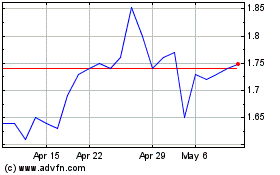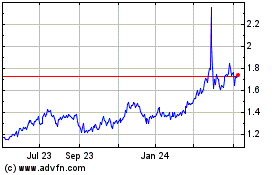By Carlos Lopez Perea
Spanish banks are getting ready to take advantage of business
that will be generated by the projects driven by EU recovery funds
this year, as the projects will be partly financed through
corporate loans.
The idea of the plan, which includes a 140 billion-euro ($169.27
billion) injection to boost growth in Spain, is to kick off
projects to modernize the economy, with the private sector
investing EUR4 for each EUR1 of public money, said a source from
Spain's Ministry of Economic Affairs and Digital
Transformation.
The Spanish government is finalizing the plan's strategic
design, which will include projects in renewable energy, small and
medium-sized enterprise digitalization and building renovations.
The next step, which will take place starting in the second
quarter, will be to announce public tenders. Once companies have
submitted their proposals, the last stage will be to allocate the
EU funding, to be supplemented by private-sector funds, the source
said.
BANKS PREPARE THE GROUND
Some banks have started to do their homework, including Banco de
Sabadell SA, which is already contacting business associations
across Spain. "We are quite active in this stage of informing
[them]," a person close to the bank said.
Sabadell is focusing on corporate credit. "After all, that is
where the profitability is", the person said, particularly in a
negative interest-rate environment that shows no signs of changing,
and amid uncertainty regarding the economic outlook.
Ibercaja is also getting ready for "the huge amount of money
which will be channeled towards the companies", a spokesman for the
bank said. Ibercaja recently restructured its executive team to
focus more on this line of business, which will be one of the keys
of its strategic plan to be approved by the board in late
March.
"These investments will drive the country for the next five
years," the Ibercaja spokesman said. "In terms of volumes flow,
corporate credit will account for a very large percentage. More
than half of the credit may be linked to these investments," he
said.
He anticipates banks will compete for the loans, particularly as
the industries which will receive the funds will probably draw on
other sectors to complete the project. "This will affect the whole
production chain, which will also require investments," he
added.
"It can be expected that these projects will have some
carry-over effect and allow for the development of further projects
linked to digitalization and energy transition which otherwise
would have happened later or not at all," said Sandra Jodar Rosell,
head of strategic planning at CaixaBank Research.
The competition is expected to be fierce among banks, not just
in terms of prices, but also of service quality, the source close
to Sabadell said. "Businesspeople know it. You cannot be misaligned
with the market in terms of prices, but this won't be the
differential element," the source added.
Generally speaking, Spanish banks believe that they can make an
important contribution at funneling and advancing the funds. "Banks
can play a decisive role in multiplying the effect of the funds and
in ensuring the money arrives in good time and manner, particularly
for those sectors where it usually takes longer, such as for SMEs,
self-employed workers and private individuals," a spokesman for
Banco Bilbao Vizcaya Argentaria SA said.
Banks could even advance the money until the funds arrive from
Brussels, said Ms. Jodar Rosell, the CaixaBank Research
analyst.
"Banks have liquidity and they can advance the funds in order to
avoid project delays," another person from the banking sector
said.
ANALYSTS EXPRESS RESERVATIONS
However, many analysts are skeptical regarding the extent of the
boost banks can hope to enjoy via the EU investment scheme.
"It will be positive for credit, but not a panacea," said Nuria
Alvarez, analyst at Renta 4. She expects that corporate credit will
start to increase in late 2021 or 2022.
"I think the impact on banks should be relatively muted, at
least the direct impact, given that the funds will be predominantly
directed towards public spending on investment," Citi economist
Giada Giani said.
Manuel Romera, director of the financial sector at the
Madrid-based IE Business School, also doesn't believe that the
credit linked to the EU funds will have a prominent role on the
economy. "The bureaucratic form of [Spain's] subsidies law or the
public contracts law lacks the functionality required for that
money to flow; it is only meant for public tenders", he said.
Rather, a potential credit boom could be linked to increases in
Spain's Gross Domestic Product, Mr. Romera said.
Jefferies analyst Benjie Creelan-Sandford also expressed doubts
around this year's economic recovery, depends on the pace of the
vaccination drive and its effect on the summer tourism season. As
for banks, "with short-term rates remaining close to historic lows,
the [banks'] margin/net interest income outlook remains challenging
in our view," he said.
The prospects of credit growth in Spain for 2021 and 2022 are
moderate--"definitely not large enough to materially change banks'
turnover," said S&P Global credit analyst Elena
Iparraguirre.
Write to Carlos Lopez Perea at carlos.perea@dowjones.com
This story was translated in whole or in part from a
Spanish-language version initially published by EFE Dow Jones, a
partner of Dow Jones & Co.
(END) Dow Jones Newswires
March 03, 2021 10:35 ET (15:35 GMT)
Copyright (c) 2021 Dow Jones & Company, Inc.
Caixabank (PK) (USOTC:CAIXY)
Historical Stock Chart
From Oct 2024 to Nov 2024

Caixabank (PK) (USOTC:CAIXY)
Historical Stock Chart
From Nov 2023 to Nov 2024
